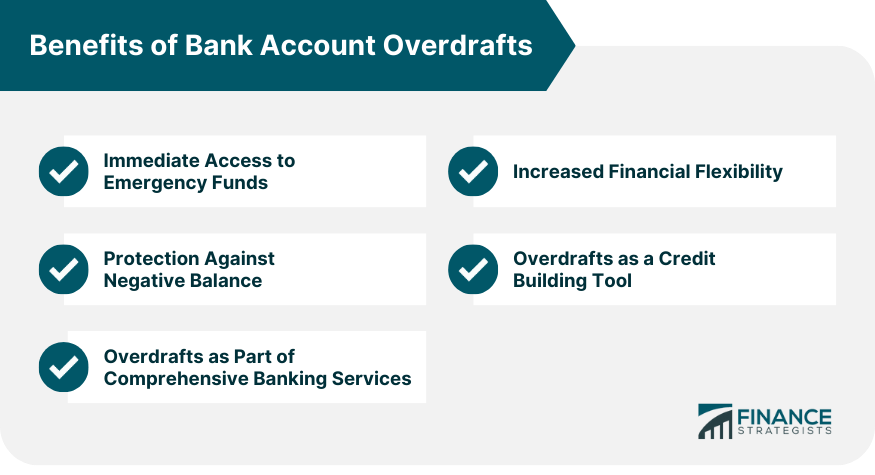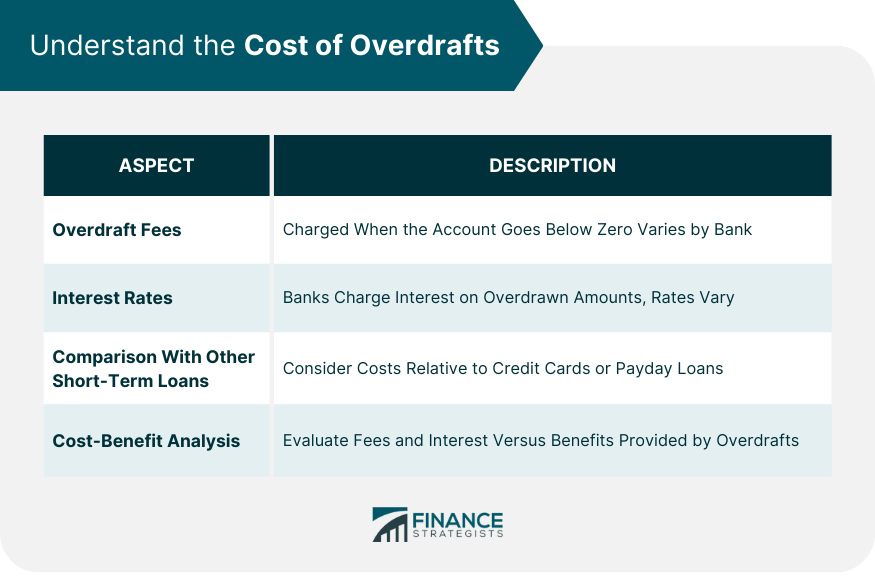A significant advantage of bank account overdrafts is the immediate access they provide to emergency funds. At times, unexpected expenses can emerge, such as unforeseen medical costs, home repairs, or vehicle breakdowns. These instances often require immediate attention and funds, which may not be readily available in your account. This is where an overdraft comes into play. The ability to overdraw allows you to cover these costs without having to wait for payday or process a loan. Overdrafts act as a financial cushion when unplanned expenses occur. They provide immediate liquidity, enabling you to meet emergency financial needs swiftly. This feature is a lifeline when faced with urgent, high-cost situations. It brings financial relief, minimizing the stress associated with such unforeseen occurrences. Checks being returned due to insufficient funds can be a significant inconvenience and often come with penalties both from your bank and the party to whom the check was issued. By providing a buffer, overdrafts can prevent such unfortunate scenarios, ensuring your checks are honored despite temporary financial shortfalls. Another key benefit of bank account overdrafts is the enhanced financial flexibility they provide. An overdraft facility offers a convenient way to manage your finances, allowing for smooth cash flow and bridging gaps between income and expenditure. The availability of overdrafts can help maintain regular cash flow, especially for those with uneven income streams, like freelancers or small business owners. This ability to manage the timing mismatch between incomes and expenses is a vital tool for financial stability. Overdrafts provide a temporary respite from financial pressures, helping bridge the gap between pay cycles or when waiting for a loan to be processed. This benefit is particularly pronounced for those living paycheck to paycheck, making overdrafts a valuable financial resource. Overdrafts also serve as a shield against negative account balances. They can prevent transaction decline due to insufficient funds, thereby helping maintain a good credit history. Overdrafts help ensure your transactions are successful, even when your account balance is low. This benefit extends to various transactions, such as ATM withdrawals, debit card purchases, and automatic bill payments, providing uninterrupted access to financial services. Avoiding declined transactions and bounced checks helps protect your credit history. As these events can negatively impact your credit score, the ability to overdraw can indirectly contribute to maintaining a positive credit reputation. Banks often see the responsible use of overdrafts as a sign of good financial management. In some cases, effectively managing your overdraft can potentially enhance your creditworthiness. While overdrafts themselves don't directly affect your credit score, how you manage them can have an impact. For instance, regularly paying off overdrafts and avoiding continual negative balances can demonstrate financial responsibility, which can help when applying for loans or other forms of credit. Maintaining a good relationship with your bank or lender is vital, and responsible use of overdrafts can contribute positively. Overdrafts can act as an indicator of your ability to manage credit, demonstrating to lenders that you can handle financial commitments responsibly. Overdrafts are often part of a broader suite of banking services. Many banks offer overdrafts as an integrated feature of their checking accounts and occasionally link them to savings accounts, credit cards, or lines of credit. Overdrafts are usually not standalone services. They are often tied to your checking account and can be linked to other accounts for greater financial management. For instance, some banks offer overdraft protection plans where funds from a linked savings account or credit line are used to cover overdrafts. Certain banks offer promotions or benefits as part of their overdraft services. These can range from lower fees for customers who frequently use the service to rewards for those who consistently maintain their overdrafts within certain limits. Although overdrafts provide many benefits, it is also crucial to understand their costs, which include fees and interest rates. A well-informed understanding can aid in effectively managing your finances. Most banks charge an overdraft fee whenever your account goes below zero. These fees vary from bank to bank and can accumulate quickly if several transactions are made while the account is overdrawn. Therefore, it is essential to be aware of your bank's specific policies and fees. In addition to fees, banks typically charge interest on the overdrawn amount. The rates can vary significantly and often depend on how long the account remains overdrawn. It is crucial to pay attention to these rates, as they can substantially increase the overall cost of the overdraft. When considering the cost of overdrafts, it can be beneficial to compare them with other forms of short-term credit. Depending on the fees and interest rates, other options, such as credit cards or payday loans, might be more or less expensive. Conducting a cost-benefit analysis can help determine whether an overdraft is the right choice for your financial situation. This includes considering the costs (fees and interest) and the benefits (flexibility, convenience, emergency coverage) provided by the overdraft service. While overdrafts offer many advantages, their responsible use is critical. This includes budgeting, understanding when to use overdrafts, and considering alternatives. Good financial planning and budgeting are crucial to making the most of an overdraft. This involves understanding your income and expenses, setting financial goals, and planning for emergencies. It's also beneficial to regularly review your financial plan to ensure it's aligned with your current needs and future aspirations. Although overdrafts can be a lifesaver in emergencies, they shouldn't be relied upon for regular spending. It's essential to consider them as a last resort for unexpected expenses or short-term cash flow problems rather than a part of everyday finances. If the cost of overdrafts is too high or you find yourself regularly overdrawn, it might be worth considering alternatives. These could include a personal loan, credit card, or building up a savings buffer to protect against unexpected expenses. Overdrafts serve as a vital financial tool providing immediate access to emergency funds, covering unexpected expenses, and preventing checks from bouncing. They enhance financial flexibility by supporting cash flow, bridging financial gaps, and protecting against negative balances. Responsible use of overdrafts can even serve as a credit-building tool and help maintain a positive banking relationship. As part of comprehensive banking services, they can be integrated with other bank offerings and may come with added benefits. However, it's crucial to understand the costs involved, such as overdraft fees and interest rates. A careful cost-benefit analysis and comparison with other short-term loans can guide effective financial decision-making. Lastly, the responsible use of overdrafts, which includes prudent budgeting, knowing when to use overdrafts, and considering alternatives, is paramount to optimally leveraging their benefits.Benefits of Bank Account Overdrafts
Immediate Access to Emergency Funds
Cover Unexpected Expenses
Prevent Checks From Bouncing
Increased Financial Flexibility
Support Cash Flow
Assist in Bridging Financial Gaps
Protection Against Negative Balance
Prevent Declined Transactions
Aid in Maintaining Good Credit History
Overdrafts as a Credit Building Tool
Impact on Credit Score
Relationship With Lenders
Overdrafts as Part of Comprehensive Banking Services
Integration With Other Bank Services
Promotions and Added Benefits

Understand the Cost of Overdrafts
Overdraft Fees
Interest Rates
Comparison With Other Short-Term Loans
Cost-Benefit Analysis

Responsible Use of Overdrafts
Importance of Budget and Financial Plan
When to Use Overdrafts
Alternatives to Overdrafts
Bottom Line
Benefits of Bank Account Overdrafts FAQs
An overdraft occurs when you spend more money than what's available in your bank account, leading the account balance to go below zero. Banks often provide an overdraft facility with a pre-agreed limit which you can spend through, and charge interest on the overdrawn amount.
Overdrafts offer financial flexibility by allowing you to access funds beyond your current account balance, especially in cases of unexpected expenses or cash flow inconsistencies. They can serve as a safety net between paychecks or income streams, ensuring your financial obligations are met despite short-term cash flow issues.
Overdrafts themselves do not directly impact your credit score. However, how you manage them can indirectly affect your creditworthiness. Frequent overdrafts or consistently high negative balances might be viewed negatively by financial institutions. On the other hand, if you manage your overdrafts well and maintain a healthy banking relationship, this can reflect positively on your credit history.
Yes, most banks charge an overdraft fee whenever you spend into your overdraft limit and also charge interest on the overdrawn amount. These fees and interest rates can vary significantly between different banks, so it's essential to understand these costs before using the facility.
Yes, there are several alternatives to using overdrafts. These may include credit cards, personal loans, or even building an emergency savings fund. It's essential to compare the cost and convenience of these options with that of using overdrafts to make an informed financial decision.
True Tamplin is a published author, public speaker, CEO of UpDigital, and founder of Finance Strategists.
True is a Certified Educator in Personal Finance (CEPF®), author of The Handy Financial Ratios Guide, a member of the Society for Advancing Business Editing and Writing, contributes to his financial education site, Finance Strategists, and has spoken to various financial communities such as the CFA Institute, as well as university students like his Alma mater, Biola University, where he received a bachelor of science in business and data analytics.
To learn more about True, visit his personal website or view his author profiles on Amazon, Nasdaq and Forbes.











